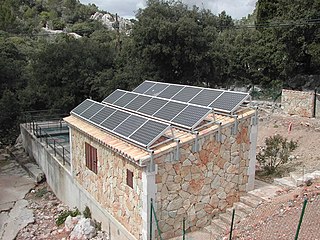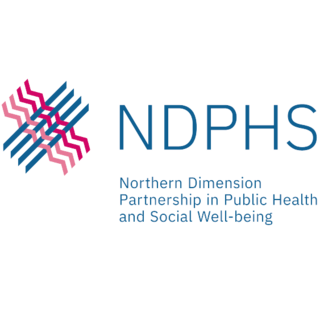ISO 14000 is a family of standards by the International Organization for Standardization (ISO) related to environmental management that exists to help organizations (a) minimize how their operations negatively affect the environment ; (b) comply with applicable laws, regulations, and other environmentally oriented requirements; and (c) continually improve in the above.

Corporate social responsibility (CSR) or corporate social impact is a form of international private business self-regulation which aims to contribute to societal goals of a philanthropic, activist, or charitable nature by engaging in, with, or supporting professional service volunteering through pro bono programs, community development, administering monetary grants to non-profit organizations for the public benefit, or to conduct ethically oriented business and investment practices. While once it was possible to describe CSR as an internal organizational policy or a corporate ethic strategy similar to what is now known today as Environmental, Social, Governance (ESG); that time has passed as various companies have pledged to go beyond that or have been mandated or incentivized by governments to have a better impact on the surrounding community. In addition national and international standards, laws, and business models have been developed to facilitate and incentivize this phenomenon. Various organizations have used their authority to push it beyond individual or even industry-wide initiatives. In contrast, it has been considered a form of corporate self-regulation for some time, over the last decade or so it has moved considerably from voluntary decisions at the level of individual organizations to mandatory schemes at regional, national, and international levels. Moreover, scholars and firms are using the term "creating shared value", an extension of corporate social responsibility, to explain ways of doing business in a socially responsible way while making profits.

Environment friendly processes, or environmental-friendly processes, are sustainability and marketing terms referring to goods and services, laws, guidelines and policies that claim reduced, minimal, or no harm upon ecosystems or the environment.

Environmental Impact assessment (EIA) is the assessment of the environmental consequences of a plan, policy, program, or actual projects prior to the decision to move forward with the proposed action. In this context, the term "environmental impact assessment" is usually used when applied to actual projects by individuals or companies and the term "strategic environmental assessment" (SEA) applies to policies, plans and programmes most often proposed by organs of state. It is a tool of environmental management forming a part of project approval and decision-making. Environmental assessments may be governed by rules of administrative procedure regarding public participation and documentation of decision making, and may be subject to judicial review.

Social impact assessment (SIA) is a methodology to review the social effects of infrastructure projects and other development interventions. Although SIA is usually applied to planned interventions, the same techniques can be used to evaluate the social impact of unplanned events, for example, disasters, demographic change, and epidemics. SIA is important in applied anthropology, as its main goal is to be able to deliver positive social outcomes and eliminate any possible negative or long term effects.
Sustainability reporting refers to the disclosure, whether voluntary, solicited, or required, of non-financial performance information to outsiders of the organization. Generally speaking, sustainability reporting deals with information concerning environmental, social, economic and governance issues in the broadest sense. These are the criteria gathered under the acronym ESG.

Environmental planning is the process of facilitating decision making to carry out land development with the consideration given to the natural environment, social, political, economic and governance factors and provides a holistic framework to achieve sustainable outcomes. A major goal of environmental planning is to create sustainable communities, which aim to conserve and protect undeveloped land.

The Global Reporting Initiative is an international independent standards organization that helps businesses, governments, and other organizations understand and communicate their impacts on issues such as climate change, human rights, and corruption.

Sustainable Development Strategy for organizations in Canada is about the Government of Canada finding ways to develop social, financial, and environmental resources that meet the needs of the present without compromising the ability of future generations to meet their own needs in Canada. A Sustainable Development Strategy for the organization needs to be developed that establishes the Sustainable Development goals and objectives set by the Auditor General Act of Canada and provides the written policies and procedures to achieve them. Sustainable Development is based on responsible decision-making, which considers not only the economic benefits of development, but also the short-term and long-term, Canadian environment and environmental impacts.
Sustainable procurement or green procurement is a process whereby organizations meet their needs for goods, services, works and utilities in a way that achieves value for money on a life-cycle basis while addressing equity principles for sustainable development, therefore benefiting societies and the environment across time and geographies. Procurement is often conducted via a tendering or competitive bidding process. The process is used to ensure the buyer receives goods, services or works for the best possible price, when aspects such as quality, quantity, time, and location are compared. Procurement is considered sustainable when organizations broadens this framework by meeting their needs for goods, services, works, and utilities in a way that achieves value for money and promotes positive outcomes not only for the organization itself but for the economy, environment, and society. This framework is also known as the triple bottom line, which is a business accounting framework. The concept of TBL is narrowly prescribed, and even John Elkington, who coined the term in the 1990s, now advocates its recall. Indeed, procurement practitioners have drawn attention to the fact that buying from smaller firms, locally, is an important aspect of sustainable procurement in the public sector. Ethics, culture, safety, diversity, inclusion, justice, human rights and the environment are additionally listed as important aspects of SPP.

The Federal Public Service Foreign Affairs, Foreign Trade and Development Cooperation is the foreign affairs ministry of Belgium and is responsible for Belgian foreign policy, relations with the European Union, development cooperation policy and certain aspects of foreign trade policy. The central government in Brussels directs the network of diplomatic and consular representations abroad.

The federal administration of Switzerland is the ensemble of agencies that constitute, together with the Swiss Federal Council, the executive branch of the Swiss federal authorities. The administration is charged with executing federal law and preparing draft laws and policy for the Federal Council and the Federal Assembly.
Stakeholder engagement is the process by which an organization involves people who may be affected by the decisions it makes or can influence the implementation of its decisions. They may support or oppose the decisions, be influential in the organization or within the community in which it operates, hold relevant official positions or be affected in the long term.
All European countries show eGovernment initiatives, mainly related to the improvement of governance at the national level. Significant eGovernment activities also take place at the European Commission level as well. There is an extensive list of eGovernment Fact Sheets maintained by the European Commission.

Jorge Manuel Lopes Moreira da SilvaGOIH is a Portuguese engineer and politician of the Social Democratic Party serving as the Executive Director of the United Nations Office for Project Services, UNOPS, since 2023.

The Northern Dimension Partnership in Public Health and Social Well-being (NDPHS) is an international networking platform for strengthening professional connections, sharing and co-creating knowledge, and developing joint activities in public health and social well-being. The Partnership is served by the NDPHS Secretariat that was established in 2012 as an international legal entity hosted by the Swedish Government located in Stockholm and funded jointly by the Partner Countries.
Sustainable products are products who are either sustainability sourced, manufactured or processed that provide environmental, social and economic benefits while protecting public health and environment over their whole life cycle, from the extraction of raw materials until the final disposal.
Environmental certification is a form of environmental regulation and development where a company can voluntarily choose to comply with predefined processes or objectives set forth by the certification service. Most certification services have a logo which can be applied to products certified under their standards. This is seen as a form of corporate social responsibility allowing companies to address their obligation to minimise the harmful impacts to the environment by voluntarily following a set of externally set and measured objectives.

India's National Voluntary Guidelines on Social, Environmental and Economic Responsibilities of Business (NVGs) were released by the Ministry of Corporate Affairs (MCA) in July 2011 by Mr. Murli Deora, the former Honourable Minister for Corporate Affairs. The national framework on Business Responsibility is essentially a set of nine principles that offer businesses an Indian understanding and approach to inculcating responsible business conduct.

Corporate environmental responsibility (CER) refers to a company's duties to abstain from damaging natural environments. The term derives from corporate social responsibility (CSR).













